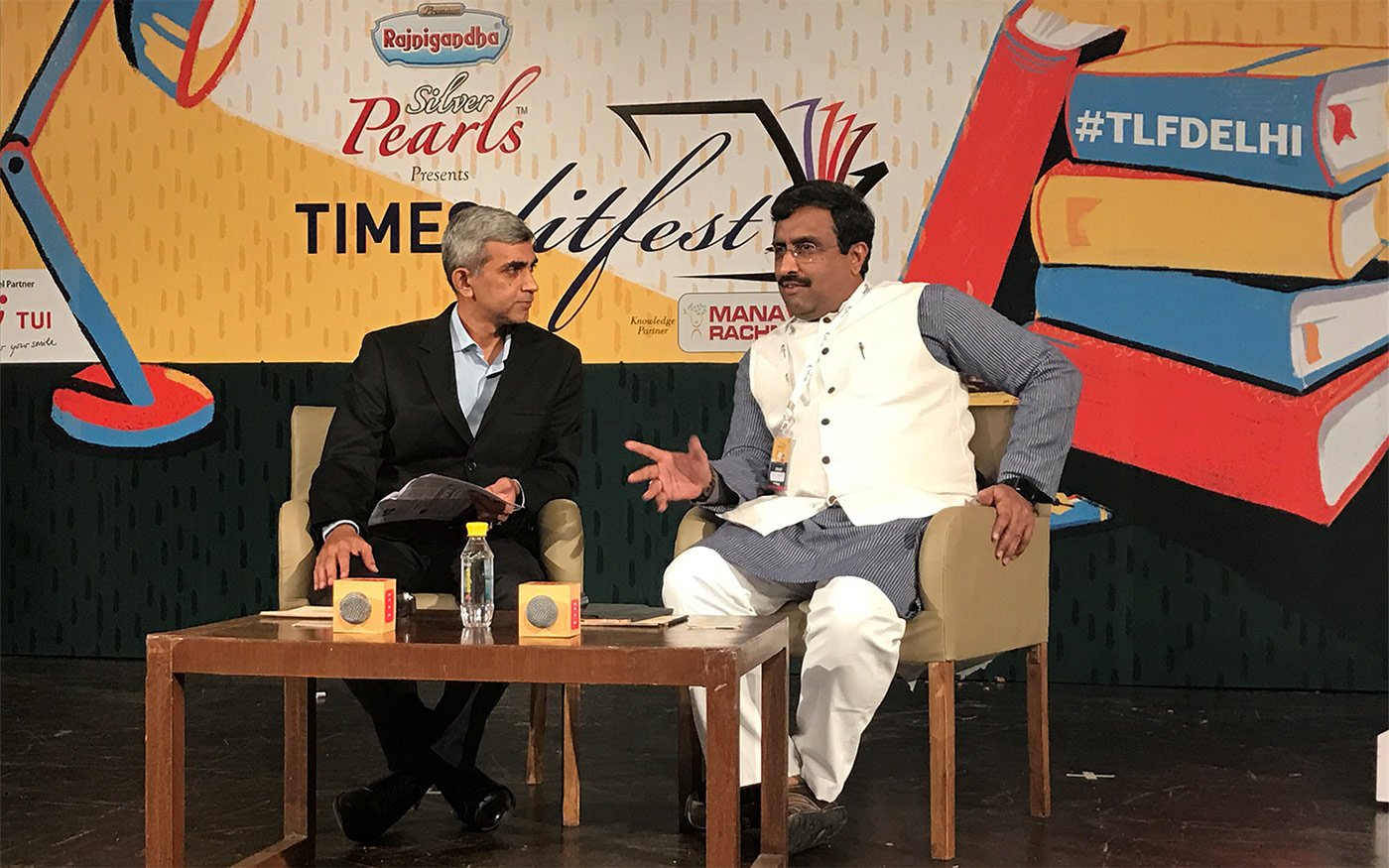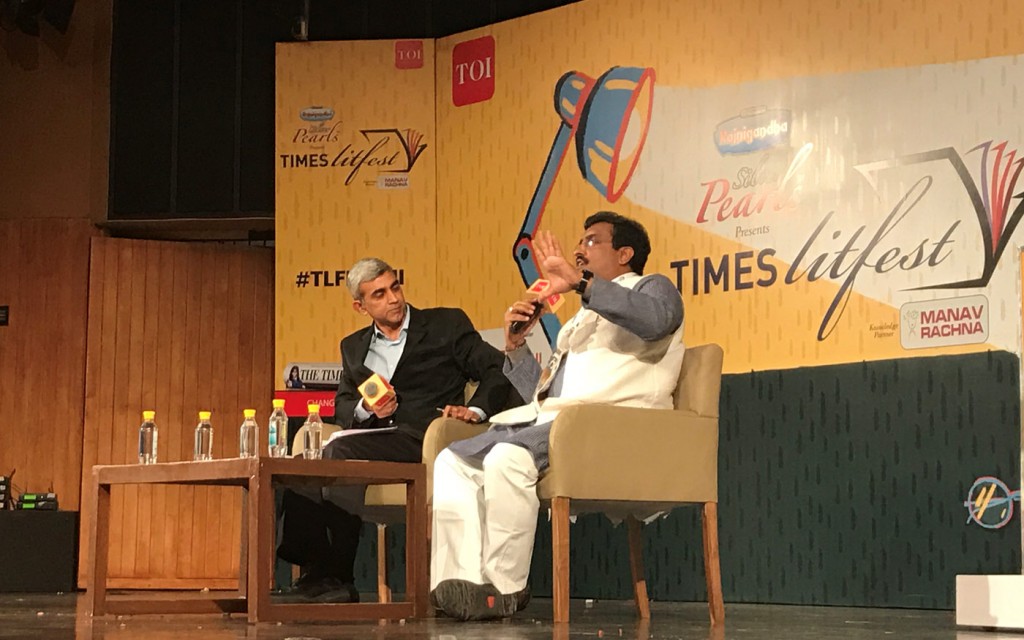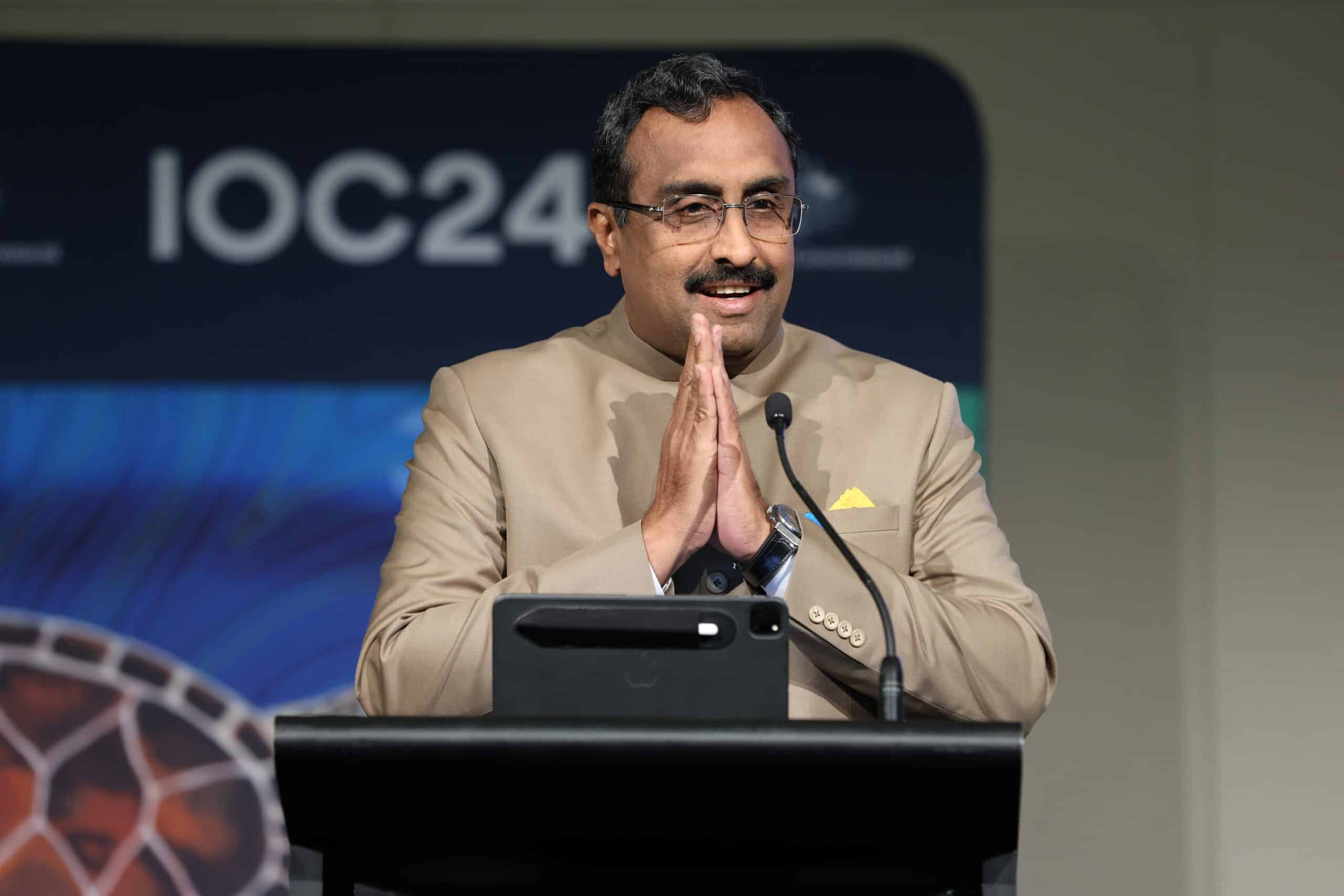
|
Getting your Trinity Audio player ready...
|
(Text of Shri Ram Madhav’s Address at the Times Lit Fest at Delhi on 26 November 2016)
Let me at the outset confess that this is my first time at any literary festival. I have dabbled in literary activity for many years in the past. But as a political activist today I am cut off from it. Politics and literary activism are hard to go together. Yet today I will try to be more literary and less political in my address.
I have been asked to speak on “India of my dreams”. I am of the view that time has come for all of us now to think beyond dreams. ‘India of my dreams’ can be an attractive proposition for every thinking Indian. But enough thinking has already been done on this. We can have dreams about our own futures, or that of our own families. But as far as India is concerned what is needed today is one great Indian dream, to which every Indian subscribes, not as many dreams as the population of Indians.
Martin Luther King:
Talking about it I am reminded of Martin Luther King Jr’s speech on 28 August 1963 at the Lincoln Memorial in Washington DC. He was leading a massive march of thousands of Negros (that was how they were called in those times) and many non-Negros calling for dignity, equality and justice for the coloured people. Those were the days of extreme racism, oppression and humiliations, both physical and mental. The crowd that gathered was angry and bewildered, wanting to take revenge for centuries of insults and injury.
But what Dr. King spoke on that day was a speech that got enshrined in world history in golden letters. He could have provoked the masses of coloured people into violence and aggression. He could have shouted about America’s barbadi (Destruction).
In stead what he spoke was about his dream. The famous speech got equally famous heading: “I have a dream”. “And so even though we face the difficulties of today and tomorrow, I still have a dream. It is a dream deeply rooted in the American dream. I have a dream that one day this nation will rise up and live out the true meaning of its creed: ‘We hold these truths to be self-evident, that all men are created equal’”, he said.
Need of the hour is not to chant ‘Bharat ki Barbadi’, but to have a great Indian dream, one that is deeply rooted in our ethos. In fact we don’t even need to dream afresh. Our great forefathers had already done that for us. But we need to build a consensus around that great Indian dream. Every Indian should feel that it is his or her own dream.
Tagore:
Seven decades ago when our forefathers fought and secured Independence, they had a dream. Rabindranath Tagore expressed it through a beautiful poem:
‘Where the mind is without fear and the head is held high;
where knowledge is free;
where the world is not broken up into fragments by narrow domestic walls’
Aurobindo:
On 15 August 1947, which also happened to be his birthday, Rishi Sri Aurobindo gave a message to the Indian nation about his dreams of Independent India. His first dream was about subcontinental unity. ‘Unity must and will be achieved, for it is necessary for the greatness of India’s future’, he said. He described his second dream as Asian resurgence and her return to her great role in the progress of human civilisation. World union, forming the outer basis of a fairer, brighter and nobler life for all mankind was his third dream; and spiritual evolution that would raise man to a higher and larger consciousness was the fourth. “India shall achieve it”, he proclaimed with supreme confidence, “because it is the will of God”.
Looking back after seventy years we realise that we are nowhere near realisation of any of these dreams. Far from sub-continental unity what we witness today is daily killings along our borders. Asian resurgence is happening, but without unity in the Asian region. It is divided, and is home to forces of fundamentalism and terrorism, like Al Quida and ISIS.
Gandhiji:
Leading light of our freedom movement was Mahatma Gandhi. Just three days before his sad demise Gandhiji had dictated a new constitution for Indian National Congress, which was nothing but the agenda for future course of action. In a way it was Gandhiji’s dream for independent India. “Though split into two, India having attained political independence through means devised by the INC, has still to attain social, moral and economic independence. The struggle for the ascendency of civil over military power is bound to take place in India’s progress towards its democratic goal. It must be kept out of unhealthy competition with political parties and communal bodies”, he dictated in that draft. It is important to mention here that Gandhiji never called what we achieved on 15 August 1947 as complete independence. He described it only as ‘political independence’. The true meaning of independence, according to him, was when we achieved social, moral and economic independence for the vast masses of our country.
Gandhiji felt that the new campaign for independence – social, moral and economic – needs to be kept away from politics and parties. It has to be essentially a popular movement. And for that reason, he also advocated for “disbanding of existing Congress organisation and flowering into Lok Sewak Sangh”.
Congress remained Congress, and became the ruling party of India immediately after independence. Gandhiji passed away and there were not many takers for his call. Socially, morally and economically we as a nation stand today far removed from what our forefathers had dreamt of.
Dr. Ambedkar:
Today is the Constitution Day. We all have to respect and imbibe the spirit of our great constitution. But it is very appropriate for our discussion to recall a warning that Dr. Ambedkar, the architect of Indian Constitution, had given on this very day exactly sixty seven years ago. While presenting the Constitution to the Parliament on 26 November 1949 this is what Dr. Ambedkar had said: “Today we are going to enter into a life of contradictions. In politics we will have equality and in social and economic life we will have inequality. In politics we will be recognising the principle of one man one vote and one vote one value. In our social and economic life, we shall, by reason of our social and economic structure, continue to deny the principle of one man one value. How long shall we continue to live this life of contradictions? How long shall we continue to deny equality in our social and economic life? If we continue to deny it for long, we will do so only by putting our political democracy in peril”.
Seven decades after Independence have we been able to achieve what Ambedkar described as ‘one man one value’ in our social and economic life? Humongous economic disparities stare at us all over the country. We are together in public places, in buses and trains, in offices etc because there is a law that criminalises untouchability. But has it fully disappeared from our social life? A Scheduled Caste person, however highly educated he may be, finds it difficult to get a house for rent, not in rural India, but right here among the educated urban elite. It has not gone from our hearts.
So the dreams are already there. What we need to do is to realise them. ‘India of my dreams’ is nothing but an India that fulfils all the dreams of all our great forefathers; an India that relentlessly pursues its grand national dream.
Pride in the Past:
Swami Vivekananda used to say that a patriot, one who loves the country, should have pride in the past glory, pain about the failings of the present, fire in the belly to act and dreams in the eyes about the prospects in the future.
 Important thing to remember is that you can’t just have one of them and then claim that you are a patriot. India is not just a nation-state in the western mould of the recent past. It is a civilisation in itself, with a recorded history of several millennia. Over the millennia, through living experience, we have evolved a set of universal values that we call as our Dharma or Sanskriti. Are you proud of that great heritage of this nation?
Important thing to remember is that you can’t just have one of them and then claim that you are a patriot. India is not just a nation-state in the western mould of the recent past. It is a civilisation in itself, with a recorded history of several millennia. Over the millennia, through living experience, we have evolved a set of universal values that we call as our Dharma or Sanskriti. Are you proud of that great heritage of this nation?
Do you feel honoured when a Max Mueller says that “If I were asked under what sky the human mind has most fully developed some of its choicest gifts, has most deeply pondered on the greatest problems of life, and has found solutions, I should point to India.”
Does it make you jump in joy when an eminent British historian like Arnold Toyenbe observes that “It is already becoming clear that a chapter which had a Western beginning will have to have an Indian ending if it is not to end in the self-destruction of the human race. At this supremely dangerous moment in history, the only way of salvation for mankind is the Indian Way.”
Does your heart get filled with joy when someone as eminent as Roman Rolland says “If there is one place on the face of this Earth where all the dreams of living men have found a home from the very earliest day when man began the dream of existence, it is India”,
But then some may point out that the past is all about certain sins and mistakes. I don’t disagree that in the long history of millennia this nation has seen several depravities and degradations. We must learn our lessons from those failings. Countries with just a couple of hundred years of history too commit blunders. Our greatness lies in our acceptance of failures and urge for improvement.
Puranamityeva Na Sadhu Sarvam Nachapi Sarvam Navamitya Vadyam
Santah Parikshanyatarat Bhajante Mudhah Parapratyayaneya Buddhihi
Everything in the past doesn’t automatically become holy; at the same time nothing is holy just because it is modern. Wise men use discretion before accepting; fools imitate.
On the touchstone of validity the world has recognised India’s great civilisational contributions.
Our Civilisational Values:
Our civilisation has taught us many values. Let me illustrate 4-5 of them.
- Sarvam Khalvidam Brahma: We said divinity is omnipresent. We disagreed with the theory that god and man are separate. We believed that everything, living and non-living, has the same element of divinity in it. Then why is conflict everywhere around us?
- Ekam Sat Viprah Bahudha Vadanti: We believed that the ultimate truth is one, while the wise men present it in different ways. Then why do we divide ourselves into Right, Left, Far Right, Far Left, Center, Cetre-Right etc? Much worse, why we practise neo-untouchability, the ideological untouchability?
- Unity in Diversity: We believed that diversity is the beauty of the mankind. Then why we want absolute conformity? Why we become intolerant to the existence of diverse views?
- Naari as Shakti Swarupini: Talking of women’s protection Swami Vivekananda used to laugh and say: “Who are you to protect her! She is herself the Jaganmata – the Mother Divine. She is Mahishasura Mardini Durga; she is Kali. Give up this arrogance of ‘protecting’; learn to ‘respect’ her”. We have to read Mahabharat from Draupadi’s perspective; and Ramayana from Sita’s perspective. Both the women were fiercely independent; the quintessential Liberals. This nation respected them as ‘Sadhwi’. But then why we see atrocities against women all around bringing so much bad name to us as a nation?
So, as Mahatma Gandhi pointed out, if we today see degradation in public life, it is not because our past was bad; it is rather because we failed to live up to the past.
Pain of the Present:
That brings me to the next question – Do we have the ‘pain of the present’? Our culture is ‘culture of happiness and bliss’. ‘Sarvepi Sukhinah Santu’ – Let everybody be happy – has been the motto of this land. It is all about material happiness also. In fact Dharma is defined as: ‘Yatobhyudaya Nisreyasa Siddhihi’ – that which brings progress and prosperity in this world and peace in the other.
The ‘other’ can be temporarily set aside as we can discuss about it when we reach there. But what about progress and prosperity today? Swami Vivekananda used to ask: ‘Do you feel? Do you feel that millions are starving today and millions have been starving for ages? Do you feel that ignorance has come upon this great nation as a dark cloud? Does it make you restless? Does it make you sleepless?’.
The corruption, the black money, the sufferings of the common people because of these social evils – do they really pain you? Or you are content with quoting an outdated Keynesian sermon and looking the other way, when in power or out of it?
Vivekananda used to say that even mere ‘pain’ is not enough. You should have the courage to act. The crux lies in there. Do you have the courage to act? It is easy to write a book denouncing poverty. I come from Andhra Pradesh. A revolutionary author by name Tarimela Nagireddy had authored a monumental work called ‘India Mortgaged’. Many youngsters grew up reading the heart rendering description of the lives of the poor in our country. But does that solve poverty?
To eradicate poverty we need to root out corruption. We need courage to take some stern steps. People may call you names when you act. They may call it ‘Tughlak Raj’, ‘Monumental Mismanagement’ etc. It is ‘mismanagement’ because they were not allowed to ‘manage’ their affairs before it came. Biggest test to your courage comes when your own people start cribbing. Do you still have it in you to tread the path?
Also needed with courage is creative and innovative thinking. We need leaders with courage, but also out of the box. Remedies of 20th century may not suit the problems of 21st century.
Conclusion:
‘Social, economic and moral independence is yet to be achieved’, ‘It has to be kept away from politics’, said Gandhiji. Governments tend to think that they have the mantra for social transformation. They need to understand that the real strength lies in the society. Chanakya described the best government as the one that ‘governs the least’.
Our vision should be to make people great. As a person trained in the RSS this is what I have learnt from the founder of the RSS to the present day leadership. For that we need to have good institutions, both public and private, good media and good intelligentsia.
I was speaking at the Halifax International Security Forum recently. One of the topics was “Let us make democracy great again”. It was the Liberal response to the victory of Donald Trump in US elections. I told them that blaming institutions for the failure of our politics is unfair. My amendment to that title, which applies to us here in India also, was “Let us make Liberal politics great again; Let us make media great again; and finally let us make psephology great again”. Today the Liberal politics represents most narrow identity politics. It has come to represent increasingly narrower and smaller sections of the society. It does no longer represent the ‘entire society’. Therein lies the failure of the Liberals. Liberalism is not bad, but Liberal Fundamentalism is.
Let our governments, rulers, political class, intellectuals and media be humble, gentle and loving towards the great people of this country. That is my dream of India



